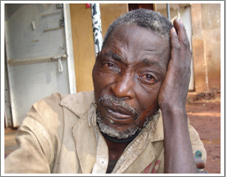Issues, Efforts and Action Required
Issues
Poverty
Older persons are among the more vulnerable groups, particularly widows with no assets, older persons living alone and older persons in remote rural areas.

Lack of income
Many older people do not have access to a regular income and sell any assets they have. They may rely on casual labouring or selling foodstuffs with little cash reward. Accessing the pension can be difficult or unpredictable even for eligible older persons.
Ill health and lack of health care
Older persons experience similar diseases as older persons in Western countries – stroke, heart disease, pneumonia, diabetes and high blood pressure - as well as HIV/AIDS and malaria. Many older persons do not visit health centres due to long distances, poor mobility and negative attitudes towards older persons. There is limited availability of drugs and limited geriatric expertise. Traditional healers are often the alternative.
Water, sanitation and personal hygiene
In rural areas where there can be long distances to safe water older people may resort to contaminated water. Even where pit latrines are available they require agility to squat. Older persons who need assistance with personal care but are isolated can suffer from very poor personal hygiene.
HIV/AIDS pandemic
The HIV/AIDS pandemic has meant that older persons are often carers of their own sick adult children and then orphaned grand children who require schooling, food, shelter and medical care. They are at risk of HIV infection but are often forgotten in HIV/AIDS education.
Abuse of older persons
Older persons are subject to abuse. There are frequent media reports in newspapers in Uganda of older women as victims of rape, of widows having their land and property grabbed by relatives as well as physical abuse following accusations of witchcraft.
Download the 2008 case study on Older Persons of Uganda by Frederick Nyanzi (1.3mb PDF)
TAFU's Efforts
TAFU has been advocating for older persons, raising awareness of their experiences and lobbying for government and non government intervention through the following activities:
- Participating in events each year to celebrate International Older Persons Day.
- Sensitisation seminars and workshops. Six were held in 2007 in three districts with older persons, medical personnel and local opinion leaders.
- Creation of an NGO network organisation to link up with other older persons NGOs in Uganda, the National Network of Older Persons in Uganda (NNOPU).
- Presentation of petition to the Honourable Speaker of Parliament in September 2006, demanding a national policy for older persons. TAFU defended the petition before the Equal Opportunities Commission in resulting in a commitment of a policy in 2008.
- Liaison with the Ministry of Gender, Labour and Social Development to progress the draft older persons policy.
- Completion of a survey in 2006 of 382 older persons (182 older people were interviewed individually, and 200 interviewed in groups) in partnership with Age Concern Devon (ACD) through a Capacity Building Program of IFA.
- Establishment of a regular fortnightly radio talk show about ageing through the National Radio Maria.
Action Required
The needs of older persons are not included in relevant programs that seek to address poverty reduction. Older persons lack adequate political representation and there is limited advocacy of their behalf.
TAFU is joining other older persons organisations in a newly formed National Network of Older Persons in Uganda, NNOPU to provide a more powerful voice for older persons and to lobby for much needed action.
On the positive side:
TAFU is joining other older persons organisations in a newly formed National Network of Older Persons in Uganda, NNOPU to provide a more powerful voice for older persons and to lobby for much needed action.
On the positive side:
- The Ugandan Constitution provides a base for action “The State shall make reasonable provision for the welfare and maintenance of the aged”;
- The Local Government Act provides for the election of older person’s representatives;
- There is a Department of Disability and Elderly within the Ministry of Gender, Labour and Social Development that has drafted a National Policy for Older Persons.
- However, the above has had little impact on improving the circumstances of older persons.
- Release and implementation of the National Policy for Older Persons.
- Establishment of a National Council for Older Persons.
- Election of older persons representatives in local government.
- Introduction of a pension or cash transfer scheme for older persons.
- Inclusion of the needs of older persons in planning and implementation of all relevant programs and policies, including poverty reduction, health, adult education, shelter, nutrition, agriculture, water and sanitation.
- Inclusion of older persons in HIV and AIDS education and support programs in recognition of their role as carers of infected people, carers of orphaned grand children and as sexually active members of society.
- Provision of community care for isolated older persons.
- Increased legal protection against financial and physical abuse.
- Introduction of health programs targeting older persons.
- Research on and dissemination of information about older persons.
- NNOPU’s work will complement the work carried out by Help Age International in recommending priorities to progress the implementation of the Madrid International Plan of Action on Ageing (2002).